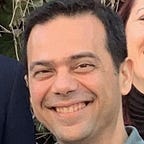WFP injects both smiles and cash into interrupted lives
In a move to fine-tune cash assistance to refugees in Turkey, a disability allowance has been incorporated into the EU-funded ESSN programme, bringing much-needed relief to beleaguered families
Her smile lights up the sparse room on a cold, wet afternoon in a far-flung Istanbul suburb. Smiles are one of the limited options Amani has at her disposal to effectively communicate her feelings.
Born with cerebral atrophy, Amani`s smile — a rare sight over the last eight years — is uplifting and brings joy to the rest of her family. But more than that, it comes as immense relief to Amani`s primary caregivers — her mother and her brother.
“I have biscuits. I also like milk, eggs, potatoes,” a beaming 32-year-old Amani said. “It is cold, my tummy hurts,” she promptly added, but retained her smile.
For her brother Ali, 30, who is the sole earner in the extended family of five, the slight upturn in the family`s fortunes have meant multi-fold benefits for him.
“It is wonderful to see my sister happy again. That is the most important thing. Of course, there are other benefits that the disability allowance brings us,” he said. “For the first time in a very long time I can take a day off on the weekend to spend with my daughter and the rest of my family.”
Like so many other Syrians, the Al Bouz family, too, has been forced to live a relatively nomadic life in search of the most basic protections. The family left their hometown Damascus in 2013, travelling initially to Lebanon before eventually making their way to Turkey in 2015.
Ali realizes they are one of the more fortunate refugee families despite all the difficulties faced globally by refugee populations. He even considers the back-breaking work he does in a marble-cutting factory on minimum wage as a blessing.
“The disability allowance has meant I don`t need to find extra work that one day on the weekend,” he said.
Ali also feels fortunate in other ways.
“My Turkish employer is very kind and even tries to help me find a bigger place to rent. He has offered to be a guarantor to landlords unwilling to rent to refugee families,” said Ali.
The Disability Assistance scheme that started being implemented last August enabled the Al Bouz family to gain slightly more financial leeway. The improvement in the mood of the entire household is, however, what makes the family happy.
The Al Bouz family has to cope with the additional hardships that are associated with severe disability. It has taken its toll — particularly when added to the numerous hardships faced by the millions of other refugees who have been uprooted from their homes and had their lives interrupted.
It was with precisely such considerations in mind that the World Food Programme and its Turkish partners came up with a way of providing tailored assistance to families with specific needs.
Candidates become eligible for disability assistance only after providing a certificate from a Turkish state-authorized medical institution confirming severe disability exceeding 50 percent of routine body functions.
The Disability Assistance scheme is part of the broader European Union funded Emergency Social Safety Net (ESSN). ESSN is a multi-purpose cash transfer scheme launched in 2016 that provides monthly assistance through debit cards to more than 1.7 million of the most vulnerable refugees in Turkey.
Those receiving assistance decide for themselves how to cover essential needs like rent, bills, food, and medicine.
ESSN is implemented through the joint partnership and collaboration between WFP, the Turkish Red Crescent, the Turkish government and the EU.
Martin Penner, the head of communications at WFP Turkey, said it was sights like this that sometimes help provide perspective.
“Sometimes we tend to get caught up in the operational details,” said Penner. “Just seeing a family be able to smile and share a few lighter moments helps us refocus and feel reinvigorated ourselves.”
Life is simply just better as far as Amani is concerned.
“I wake up in the morning. I visit my cousin. Then I play with Samira. I also love going to the park. I play in the sandbox with Samira and also watch her play,” said Amani.
Samira is Amani`s 2-year-old niece. Amani`s mother, also named Samira, succinctly sums up the entire family`s feelings.
“We are very grateful for the disability allowance. It makes caring for Amani much easier. At least I don`t need to worry about being able to afford things like biscuits, milk and the like,” said Samira. “Nothing is like being in your own house in your own city. Until then, all these things like the disability allowance give us hope and for that we are grateful.”
